You have your preps all set up to keep yourself and your loved ones safe and comfortable post-collapse and you have made sure that you have keep it all under the radar. No one outside of your immediate family knows about all the food and water you have stored away, which is just how it should be. So what happens when disaster hits, the grid is down, and you are enacting your survival plan by cooking dinner on the camp stove? Simply put, if you don’t take precautions, you have just hung a great big sign over your house saying “Food Is Here.”
That’s right. When you cook, especially when you cook outdoors, the smell of the cooking food will drift on the air currents. In fact, smells can travel for as much as half a mile from where you are cooking it. If it is post-collapse and there are hungry people out there, you can bet that every one of them who smells what you’re cooking will come calling – and they might not be the ideal dinner guests. This means that you will need to learn how to cook/prepare food in such a way that it doesn’t have an odor that will attract unwanted visitors.
Grace Period
 When society collapses, you will have a grace period of about three days before things really start to go south because most people have at least three days’ worth of food in their homes at any given time. The lucky ones might even have food for a day or two longer. However, it won’t take long before they use up what they have and start wondering where their next meal is coming from.
When society collapses, you will have a grace period of about three days before things really start to go south because most people have at least three days’ worth of food in their homes at any given time. The lucky ones might even have food for a day or two longer. However, it won’t take long before they use up what they have and start wondering where their next meal is coming from.
For this reason, you can use the first three days after the SHTF to cook up a storm. Use up all of the perishable food in your house and cook meals your family will enjoy. Perhaps you can use this time to can, dehydrate, or otherwise preserve some of the fresh food you have in the house. However, once this grace period has passed, the situation will start to deteriorate quickly and by the time a week (at most) has passed you will have a lot of hungry, desperate people out there. With this in mind, you need to learn how to prepare food without any tempting odor escaping.
Related: Preserving Potatoes Year Round – A Solid Choice for Preppers
Tips on Cooking without Smells
Fortunately, there are things you can do to minimize the odors coming from the food you prepare for yourself and your family. Whether you live in a rural, suburban, or urban area, there are a number of aspects to the cooking process that you can control to keep your cooking under the radar.
Where You Cook
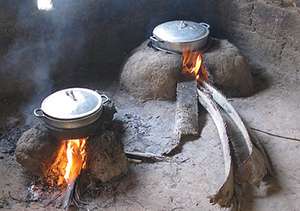 If you are able to, cook indoors. There is less of a chance of cooking smells wafting through the air if the cooking is done inside. If you have to prepare some of the meal outside, then keep that to a minimum whenever possible.
If you are able to, cook indoors. There is less of a chance of cooking smells wafting through the air if the cooking is done inside. If you have to prepare some of the meal outside, then keep that to a minimum whenever possible.
When You Cook
Cook in the early hours or late hours of the day, when most people are likely to be sleeping. This will minimize the chances that someone will smell anything from your cooking. It is also advised to cook when it isn’t windy when cooking outdoors. If you cook when there is little or no breeze, then any potential smell from your cooking won’t spread very far.
How You Cook
You will have a number of options for cooking without electricity, provided you have prepared ahead of time. You might have plans to use your barbecue, a fire pit, a rocket stove, or a camp stove. Whatever way you choose to cook your food, use a fuel for your cooking that does not produce smoke or any visible means of identifying your location (this includes wood and charcoal). This leaves you with fuels such as propane, alcohol, butane, or natural gas.
If you have a gas generator, you will draw attention to yourself as soon as you turn it on because these generators are noisy. Opt for a solar generator, if possible, which will run quietly. You can hide it outside during the day and let it charge and then use it at night to power a hotplate or something similar to warm up some dinner.
What You Cook
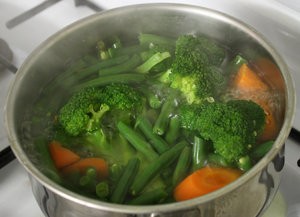 When it comes to what you cook, you want to keep it simple. Cook food that doesn’t have a lot of odor and avoid using herbs and spices that give the food extra flavor. As nice as they are, they increase the odor of the food. Just think of the smell of Indian food cooking. When you do cook, prepare food for multiple meals (but not so much you won’t be able to eat if before it spoils) so you are cooking less often. This will result in less chance of being detected.
When it comes to what you cook, you want to keep it simple. Cook food that doesn’t have a lot of odor and avoid using herbs and spices that give the food extra flavor. As nice as they are, they increase the odor of the food. Just think of the smell of Indian food cooking. When you do cook, prepare food for multiple meals (but not so much you won’t be able to eat if before it spoils) so you are cooking less often. This will result in less chance of being detected.
Use cooking methods that minimize odor, specifically boiling or simmering. Avoid frying, baking, roasting, grilling, or toasting food. You can get cooking bags that, when you are cooking, will seal in the aroma of the food. Aluminum foil will also help lock in the smell. Neither of these will keep the smell down completely, but will certainly make a difference.
Related: 20 Foods that Will Outlast You
One very good way of cooking is to use a thermal cooker, which is a type of insulated crock pot. With this you can start the cooking process outdoors. Bring your water to a boil for ten minutes and then take it inside, add your ingredients, and seal it in inside the thermal container for 6-8 hours. It will continue to cook the whole time and no odors will escape.
 The way your food is prepared and stored prior to use also has an effect on how much it smells when being cooked. It is wise to eat freeze dried foods when possible, as this only requires hot water to be added and will minimize the smells coming from the food. Another option are MREs (meals ready to eat), which are already prepared and require minimal amount of preparation and cooking time.
The way your food is prepared and stored prior to use also has an effect on how much it smells when being cooked. It is wise to eat freeze dried foods when possible, as this only requires hot water to be added and will minimize the smells coming from the food. Another option are MREs (meals ready to eat), which are already prepared and require minimal amount of preparation and cooking time.
Final Tips
Even though it is safer to cook inside to avoid people smelling the food you are cooking, you shouldn’t do this at the risk of burning your house down or generating carbon monoxide, which will kill you and your family. Be very mindful about the safety of cooking inside.
In addition, you need to consider the garbage that is left behind when you cook food. Is there packaging or leftovers that could draw attention should people see it? For this reason, it is important to cook only what you need. If you cook for more than one meal at a time, don’t cook so much you can’t eat it before it goes bad. If you do have scraps, try to make use of them in some way, such as feeding it to pets or as compost.
Remember that food is the primary thing the majority of people will be looking for when the collapse comes. If they know you have it, they will come and take it. If you can keep your cooking and food preparation under the radar, you will be able to enjoy good food, hot meals, and the health and energy you need to see your way through hard times without unwanted visitors trying to take it away from you.
You may also like:
This Super Root Preserves Meat Indefinitely! 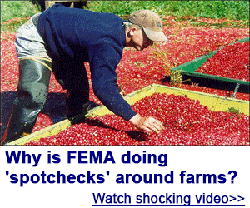
H2O Dynamo – The Awesome Device That Turns Air Into Fresh Water! (video)
The Most Delicious Cookie that you Can Make at Home

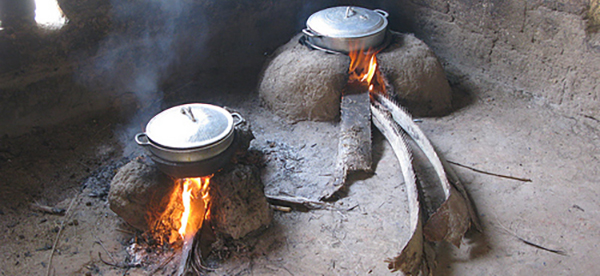

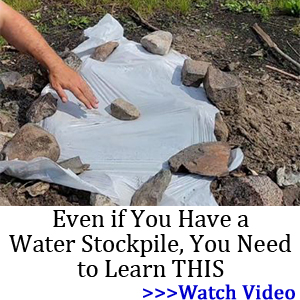





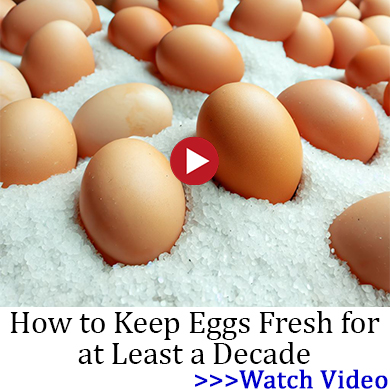
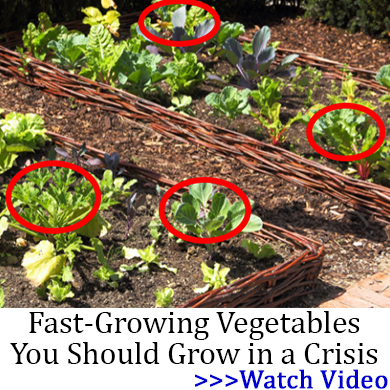
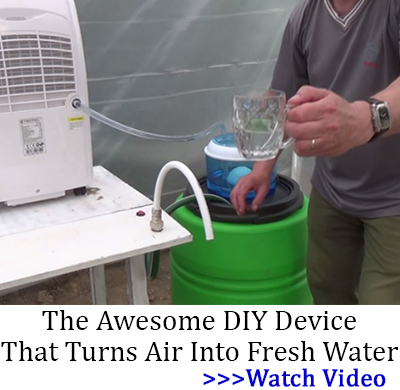
Fabricating a cooking overhead hood and hooking it up to your chimney or plumbing soil pipe will channel those cooking smells up and above ground level …
There’s a natural upflow on both channeling outlets but for additional “pull” a 12V muffin fan could be an assist ….
This one aspect of living “dark”, in that initial chaos stage, that doesn’t get near enough coverage – any kind of cooking is going to be nothing but ringing the dinner bell for desperate sheeple and dangerous raiders ….
Never thought about using the first three days post-SHTF for cooking. Good idea.
The following cooking method will (1.) generate no smell;
(2.) save fuel. Here’s how you do it. (A.) Say you’re having spagetti with tomato sauce and canned meatballs.
(B.) Set aside two pots with tight-fitting lids; one pot for the spagetti, the other for the sauce and meatballs.(C.) Fill the first pot with cold water, place it on a propane camp stove and bring it to a boil. (Because it is plain water, boiling it will not generate any smell). (D) As soon as it comes to a full, rolling boil, turn OFF the propane.
(E.) Dump in the dry spagetti pasta. (F.) Put on the lid. (G.) Pick up the pot with the spagetti and water and place it in to a styrofoam drink cooler, after first wrapping the pot with a space blanket. (H) Fill the styrofoam cooler with packing peanuts as insulation to keep the heat in. (I). Now put the lid on the styrofoam cooler. (J) Go to the second pot; dump in a can of meatballs and a can of tomato sauce, plus any other seasoning (parmesian cheeze, etc.). (K) Place the lid on the pot and bring it to a boil, when it boils, immediately shut down the propane flow. (L) Take the hot, lidded pot to a second styrofoam cooler, place the pot inside, wrapped in a space blanket, fill the cooler with packing peanuts, place the lid on. (M) Wait 5 or 6 hours. You will open the pots to a hot, delicious dinner and no cooking smell!
I have dehydrated most all of my herbs, spices and onions, garlic, peppers and other things you use for seasonings. I then run them through the food processor to make them a very fine flake and powder like black pepper flakes. then when cooking things with little odors, rice, potatoes, spheghetti or other veggies, at the last minute you can add the flakes for seasonings and they intergerate in the food fast. not hardly any odor, but lots of taste. You can also use them to add some beef or chicken bullion with the spices n veggies flakes to make a more hardy hot cup of soup to drink when cold, or on the run.
would be good not to attract bears as well.